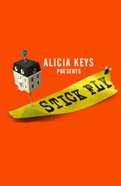Stick Fly Scribe Lydia R. Diamond on Getting 'Lucky' with Producer Alicia Keys and Director Kenny Leon
About the Author:
Playwright Lydia R. Diamond's work has been produced by America’s finest regional theaters, including the Goodman in Chicago and the Huntington in Boston. She's riding the crest of her growing national reputation with her Broadway debut, Stick Fly, produced by Grammy winner Alicia Keys. In Stick Fly, Diamond explores the dynamics of a wealthy African-American family who has gathered in Martha’s Vineyard. Diamond is also the author of Stage Black, The Gift Horse, Voyeurs de Venus and The Bluest Eye, an adaptation from Toni Morrison's novel. Below, she reveals the impetus for working on Stick Fly, what she loves about working with director Kenny Leon, and why she considers herself a very lucky playwright.
![]()
Stick Fly began when I was writing another play called Voyeurs de Venus. It’s about Saartjie Baartman, who was derogatorily referred to as the Hottentot Venus—it was a horrible, sad, awful, gruesome show to write and to research, though it is an entertaining, sometimes heartbreaking, often funny play to see. To give myself an emotional break, I decided to write something a little more fun, and that became Stick Fly. It was also an exercise in writing a structurally traditional play, which was very different from what I’d written before. I told myself that I was going to experiment with the form on the Aristotelian well-made play, and that is how the impetus to do it was born. The people and themes were already in my mind, and I let them inform the events of the story.
We may be covering new territory for a Broadway play, but I don’t think it’s because this type of story hasn’t been written before. I think it’s because it’s taken us a little too long to embrace a different way of seeing African-Americans on stage. We’re very used to seeing our race portrayed in stories with the foot of the white man on the shoulders of the black people. But we haven’t been given a lot of room to tell our own stories—full of the various “things” humans deal with outside of the parameters of race. Stick Fly centers on a black family, so there are certainly conversations about race, but it’s really a story about family, love and relationships, and the kind of dynamics that we all deal with every day.
I want to be very humble and clear that I don’t think I’m the first person that’s written this kind of story. I’m just very lucky to be doing it at a time when we are coming to understand that this is another demographic in America and that theater can actually support a wider range of stories about people of color.
Stick Fly was first produced in Chicago by Congo Square Company, directed by Chuck Smith. I’d had a reading of it at Chicago Dramatists, where I’m a resident playwright, and the then-artistic director Derrick Sanders heard the first act of the play (all I’d written at that point!) and he committed to producing a full production. I quickly wrote the second act and the rest is history. These really nice kismet things kept happening. Derrick Sanders worked with Kenny Leon as the assistant director on Gem of the Ocean, and that led Kenny to become familiar with Stick Fly. Derrick then directed the show's second production at Kenny’s company True Colors, and then Kenny came on board as the director for the last production before Broadway, a co-production with Arena Stage and the Huntington Theatre.
Kenny and [producer] Alicia Keys had worked together on her “As I Am” tour, and the president of her company saw Stick Fly performed in D.C. and Boston. Alicia fell in love with the script and wanted to be a part of bringing it to Broadway. The icing on this wonderful cake, which I attribute to her commitment to quality work, generosity of spirit and investment in the characters, is her commitment to write new music for the show. It doesn’t get any better than that.
Like any play, Stick Fly has gotten tighter and tighter every time we’ve done it. It’s such a luxury in America to be able to finesse a play over multiple developmental productions—playwrights need that. We’re a premiere-happy society, but I think the play isn’t actually finished until it has had its third production, and then it just gets better and better.
Kenny Leon is so talented. He is also a playwright’s dream of a director because, above all else, he values the words that the playwright has written. There’s nothing better for a playwright than to hear the director say to the cast on the first day of rehearsal, “Our job is to make these words sing.” It’s a wonderful way to begin a rehearsal process.
In the rehearsal room, Kenny is a fan of collaboration. It’s a wonderful ensemble piece, which always makes for a fun time. It’s such a great cast—we’re having fun and working hard, and it’s pretty amazing. What’s not to enjoy about working with talented, intelligent, passionate people? We get to do what we do at the top of our game, and we never stop appreciating it. Everyone is just joyful, which I think is the way theater is supposed to be. I don’t know why you would do theater if you weren’t having fun, and telling a story you're invested in! I’m a very, very lucky playwright.
Related Shows
Articles Trending Now
- Curtain Up on George Clooney in Good Night, and Good Luck on Broadway
- Odds & Ends: Dorian Gray Star Sarah Snook and Glengarry's Kieran Culkin Have a Succession Reunion on Broadway and More
- Molly Osborne Is Making Her Broadway Debut as the Desdemona to Denzel Washington's Othello—Maybe Someday She'll Believe It
